Turtle Noses: Do Turtles Have A Good Sense Of Smell
Turtles stand out as remarkable creatures with their unique adaptations and senses. Among these senses their olfactory abilities, though less renowned than their iconic shells. And some may ask, do turtles have a good sense of smell?
Yes, turtles have a good sense of smell, particularly when they are in the water, but the ability to detect scents can vary among different turtle species. They have adapted to draw water in through their noses and expel it through their mouths, associating pulsating throat movements with the act of smelling. This adaptation is especially useful for aquatic turtles like sea turtles. They can also feel vibrations and changes in water pressure.
Turtles use their sense of smell not only for finding food but also for detecting potential mates and predators, especially in environments with limited visibility, like murky water. However, they generally rely more on their vision and tactile senses than on their sense of smell.
Do Turtles Have Noses?
Yes, turtles do have noses. Turtles possess nostrils located at the end of their beak-like snout, and these nostrils serve as their means of breathing. They can close these nostrils to prevent water from entering when they are underwater and can open them again to take a breath when they resurface.
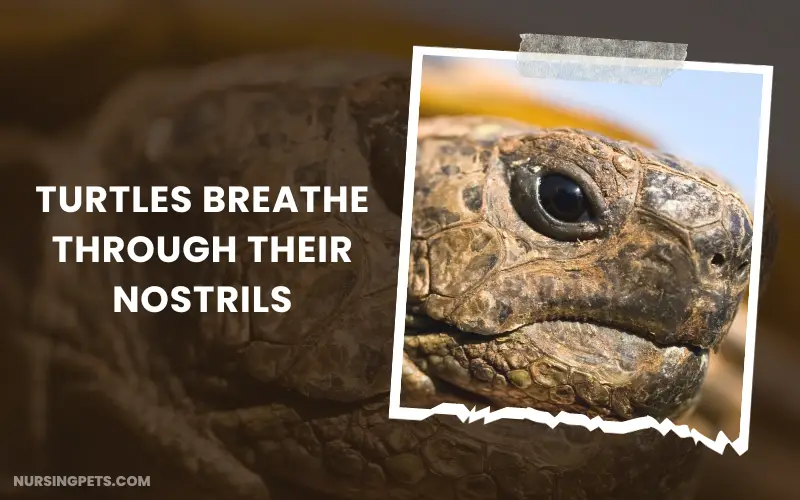
As a semi-aquatic animal, this helps turtles to live in both water and land. However, there are several types of species, and each has its own adapted lifestyle for survival.
How Do Turtles Smell?
Turtles, like many other reptiles, have a sense of smell, but it works differently from that of mammals. They have nostrils, also called nares, located on the sides of their heads, but these nostrils are primarily used for breathing, not for smelling.
These reptiles are not known for their acute sense of smell, and their olfactory (smell-related) capabilities are limited compared to mammals. Here’s how turtles typically use their sense of smell:
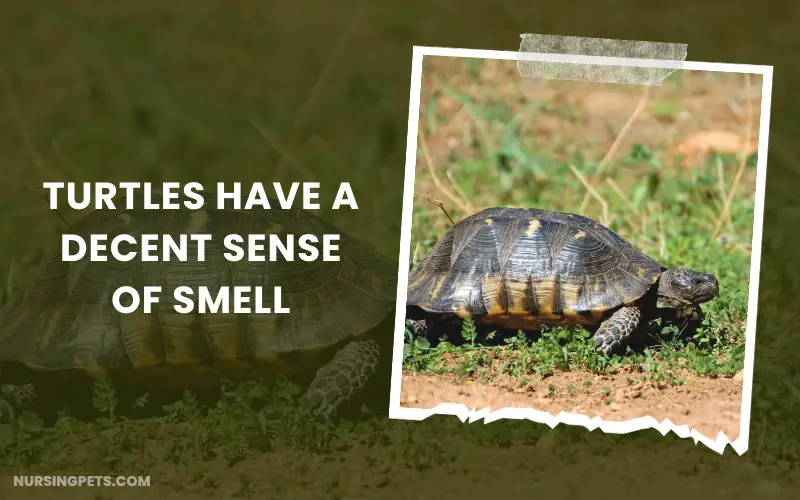
Basic Olfaction: Turtles can detect certain chemical cues in their environment through their nostrils. These cues may include pheromones, which can help them identify potential mates or navigate during migrations.
Nostrils: As mentioned, these reptiles have nostrils located on the upper part of their beak or snout. Nostrils are used for both breathing and smelling. When a turtle breathes, it draws air into its nostrils, and some of the molecules in the air may contain scents or odors.
Chemoreceptors: Turtles have sensory cells that detect chemical stimuli in the environment. The chemoreceptors in their nose and the roof of their mouth help them find their prey, mates, and home.
They also have chemoreceptors in their skin and cloaca that allow them to sense oxygen levels in the water.
Aquatic Adaptation: Aquatic turtles, like sea turtles and freshwater turtles, have adapted to their watery environment. While submerged, they can detect chemical cues in the water using specialized sensors on their skin and in their mouth. This allows them to locate food, navigate, and find mates.

Terrestrial Turtles: Terrestrial ones, such as box turtles or tortoises, also have a well-developed sense of smell, but they rely less on their nostrils and Jacobson’s organ or “vomeronasal organ” to detect scents in the air.
However, they can use their sense of smell to locate food, identify potential predators, and navigate their surroundings [source].
How Good Is Turtles Sense of Smell?
A turtle’s sense of smell varies depending on the species, but in general, they have a relatively good sense of smell, which they use for various purposes in their daily lives. Here are some key points about a turtle’s sense of smell:
Aquatic Turtles and Sea Turtles
Do turtles have a good sense of smell in water? Aquatic turtles, including sea turtles, have well-developed olfactory senses. They rely on their sense of smell to locate food in the water.
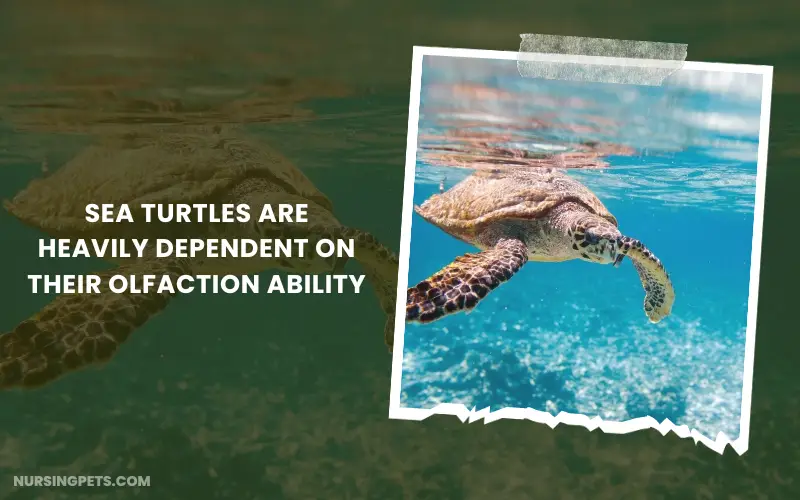
Sea turtles, in particular, are known to have acute olfaction, allowing them to detect scents even in murky ocean waters. They can open their mouths slightly and draw in water through their nose to pick up scents, helping them find prey like shrimp or jellyfish.
So, can turtles smell underwater? Yes, turtles can smell underwater. As mentioned, they have a decent sense of smell that helps them to find food, locate mates, help in navigation, and avoid predators.
Land Turtles
While land-dwelling turtles (terrestrial turtles or tortoises) also have a sense of smell, they may not be as pronounced as in their aquatic counterparts. But land dwellers can use their sense of smell to find food, recognize mates, and navigate their environment.
Another question we often hear from our readers is, do snapping turtles have a good sense of smell?
Yes, snapping turtles have a good sense of smell. They use their sense of smell, along with their vision and touch, to detect prey in the water. Snapping turtles also have a vomeronasal organ in the roof of their mouth that helps them to smell and taste food.
Do Turtles Have Different Smelling Abilities?
Yes, turtles have different smelling abilities depending on their species and habitat. For example, tortoises can smell with their throats by pumping air through their mouths, while sea turtles can smell by taking in a gulp of seawater and washing it over their nasal organs.
To give you a clear idea, the smelling abilities of turtles can be influenced by their environment and lifestyle. Aquatic turtles, such as sea turtles, often have a heightened sense of smell because they rely on it for hunting, navigation, and locating suitable nesting sites.

On the other hand, land-dwelling turtles, like tortoises, may have a less developed sense of smell since their terrestrial habitat demands different sensory adaptations, such as vision and vibration detection.
Moreover, turtles may use their sense of smell to communicate with other turtles. This suggests that their olfactory abilities have a role in their social interactions and mating behaviors.
Therefore, the extent of their smelling abilities can indeed differ based on their species and the specific ecological niches they inhabit. Turtles’ sense of smell likely serves multiple functions, including finding food and communicating with their fellow turtles.
Do Baby Turtles Have Sense of Smell?
Yes, baby turtles have a sense of smell. Researchers have found that baby sea turtles react to the scent of shrimp in water, which helps them locate food. Baby turtles also use their sense of smell to find their way to the ocean after hatching from their nests on the beach.
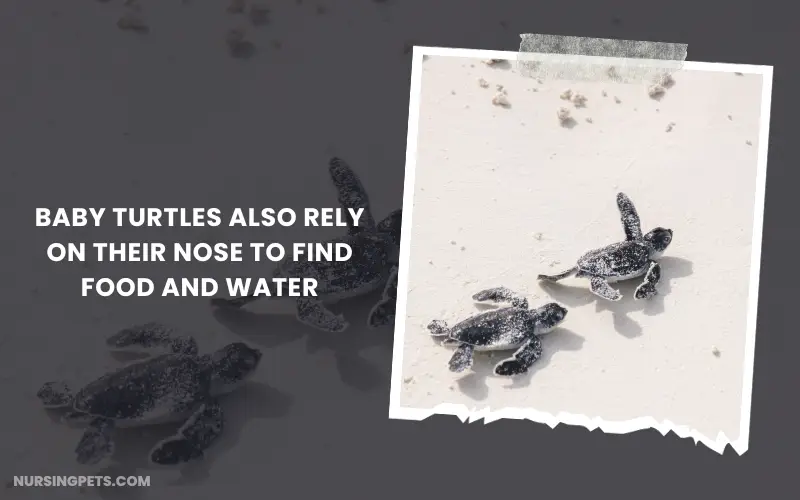
A newborn turtle’s sense of smell, meanwhile, may not be as sensitive as an adult turtle’s, and it may take them some time to gain the ability to interpret various odors accurately.
But compared to aquatic turtles, land baby turtles may rely less on their sense of smell for finding food and navigation.
How Do Turtles Use Their Sense of Smell?
Turtles use their sense of smell in several ways to aid in their survival and daily activities:
Locating Food
Can turtles smell their food? Yes, turtles have a sense of smell and can use it to locate and identify their food. As covered, turtles, especially aquatic ones like sea turtles, have an acute sense of smell in the water.
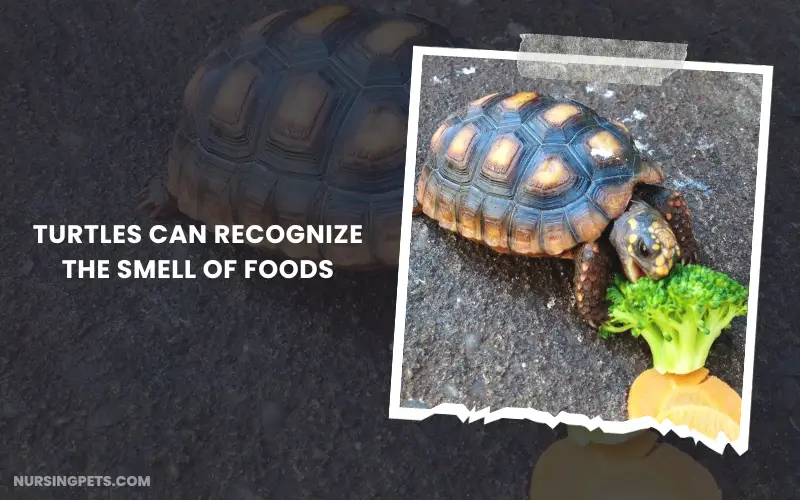
They can detect the scent of prey, such as fish, shrimp, or seagrass, even in murky water. This adaptation helps them find food.
Finding Mates
During the breeding season, turtles use their sense of smell to locate potential mates. They detect pheromones and chemical cues released by individuals of the opposite sex, aiding in reproduction.
Navigation
Sea turtles, in particular, use their sense of smell for navigation. They can detect the chemical composition of seawater, helping them return to their nesting beaches or navigate during migration.
Avoiding Predators
Turtles can use their sense of smell to detect the presence of predators, whether in water or on land. This ability helps them take evasive actions to avoid danger.
Nesting Site Selection
Female turtles rely on their sense of smell to find suitable nesting sites for laying their eggs. They detect scents in the sand or soil that are ideal for egg deposition.
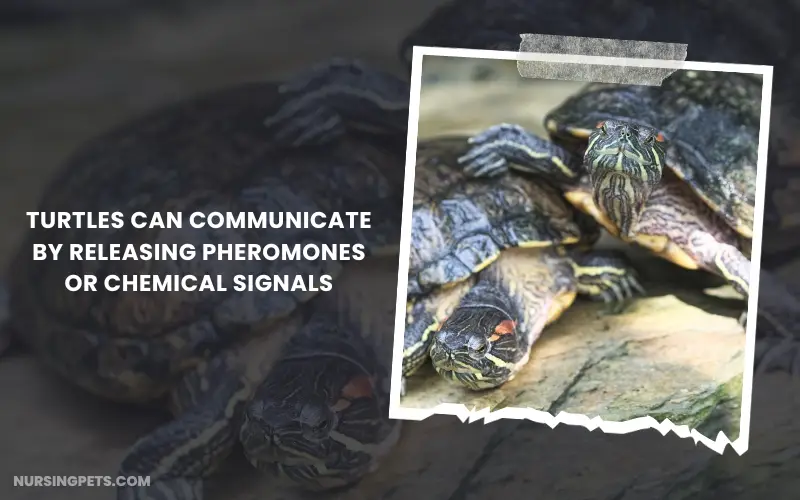
Communication
Turtles also use scent to communicate with each other. They can release pheromones or chemical signals into the water to convey information about their reproductive status and more.
Recognizing Their Own Territory
For certain turtle species, identifying their own region requires the use of scent. They have the capacity to sense the smell of other turtles nearby, and they may use this talent to mark their own territory and prevent disputes with other turtles.
How Do Turtles Use Their Sense of Smell to Find Food?
Turtles use their sense of smell to find food by detecting and differentiating between different scents in the water or on land. They have olfactory membranes inside their nostrils that allow them to smell both in and out of the water.
Underwater (Aquatic/Semi-aquatic Turtles)
Imagine being underwater with your eyes closed and trying to find a snack. That’s what sea turtles often face. Luckily, they have an incredible sense of smell when they’re in the water. Even in the murkiest oceans, they can pick up scents, particularly those of their prey, like shrimp.

To do this, they slightly open their mouths and draw in water through their noses, sort of like tasting the ocean air for hints of dinner.
Jacobson’s Organ
As mentioned, turtles have a secret weapon – a specialized organ called the vomeronasal organ, or Jacobson’s organ. This super-smelling tool is tucked away on the roof of their mouths. It’s like their personal scent laboratory, allowing them to detect and process various smells, including the aroma of food.
Land Turtles
Box turtles and other terrestrial turtles rely on their sense of smell to locate prey. Insects, snails, and earthworms are the main types of prey they pursue on land. Initially, they will utilize their sense of smell to find probable food sources, and then they will turn to their eyesight to follow and catch their prey.
Can Turtles Differ Between Different Smells?
Yes, turtles can differ between different smells. Turtles have a decent sense of smell, allowing them to detect and differentiate between different scents in the water or land. Turtles can smell the difference between their prey, mates, predators, and other environmental cues.
While turtles don’t have a sense of smell as refined as some animals, their olfactory system is effective at helping them distinguish between various scents in their environment. Turtles can also smell the difference between their own species and other species of turtles or reptiles.
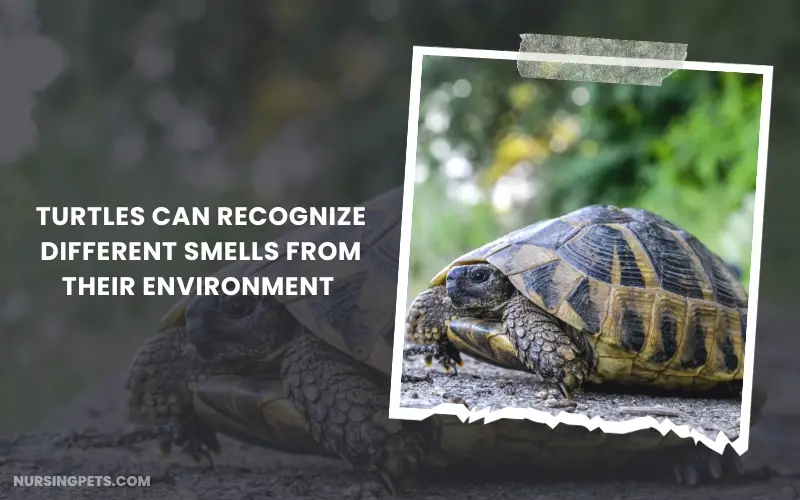
The ability of turtles to detect and distinguish between distinct odors has been shown via scientific studies.
For example, a study that appeared in the Journal of Comparative Physiology revealed that red-eared slider turtles could differentiate between various odors and even identify the fragrance of certain individuals from the same species.
Which Factors Can Affect a Turtle’s Sense of Smell?
Numerous factors exist that could influence the olfactory perception of a turtle, including but not limited to the effect of the turtle’s variety, age, environment, and well-being. Several critical factors that can impact a turtle’s olfactory abilities include:
Variety in species
Different turtle species possess individual scent sensitivity levels. When compared to their oceanic counterparts, certain varieties of freshwater turtles demonstrate a less advanced olfactory perception despite the critical role scent plays in their ability to navigate and procure food.

Age Difference
Young turtles might be like children learning to recognize scents, while older, more experienced turtles have finely tuned olfactory skills. So, it is conceivable that juvenile turtles lack a comparably sophisticated olfactory system.
Polluted Environment
Imagine trying to smell flowers in a room filled with strong chemical odors. Pollution, pesticides, or contaminants in the water can disrupt a turtle’s sense of smell by altering the chemical makeup of its environment.
Bad Health
When we catch a cold, our sense of smell diminishes. Turtles experience something similar. It can affect their ability to pick up scents if they’re not feeling well, whether from respiratory infections or other ailments.
Water Quality
Think of it like trying to taste fine wine in a polluted river. Poor water quality, caused by pollution, toxins, or excess sediment, can muddle a turtle’s aquatic aroma scape, making it challenging for them to pick up important scents.
Can Turtles Sense Their Owners?
In contrast to dogs or cats, turtles lack the cognitive capacity to identify their owners. They may, however, become used to their owner’s presence and link it with pleasant activities like petting or feeding.
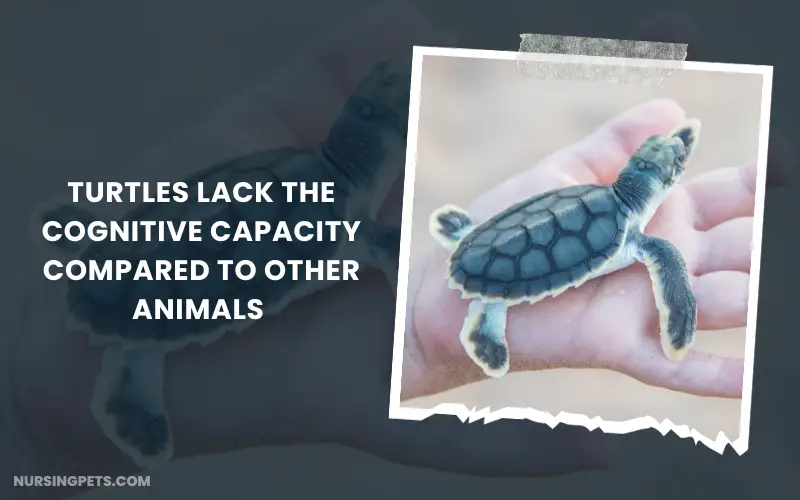
For instance, if a tank owner regularly offers food, the turtle can learn to identify their presence with food and swim towards it.
Frequently Asked Questions
1. How Good Is a Turtle’s Sense Of Smell Compared to Other Animals?
Although turtles have a decent sense of smell, it is not as keen as that of certain other animals, such as dogs or cats. However, turtles can still navigate their surroundings and find food by using their sense of smell.
2. How Far Can a Turtle Smell?
Species, scent intensity, and environmental factors all affect how far a turtle can smell. Certain odors may be picked up by certain turtle species from as far away as several hundred meters.
3. Can a Turtle’s Sense Of Smell Be Damaged By Exposure to Strong Odors?
A turtle’s sense of smell may indeed be harmed by exposure to strong scents or toxins. So, it is best to refrain from utilizing pesticides or cleaning supplies with strong scents close to their environment.
Final words
So you now know something about a turtle’s sense of smell. Since they have developed special adaptations to thrive in their environment, their sense of smell is no exception. Turtles have a decent sense of smell compared to other animals.
They use it for finding food, mates, and navigation with others. However, some factors can affect their olfactory ability. Keep your turtle’s environment clean and odor-free to have better living conditions.
References:
- https://sdzwildlifeexplorers.org/animals/turtles-and-tortoises
- https://www.sciencedirect.com/science/article/abs/pii/S0040816616300015
- https://seaworld.org/animals/all-about/sea-turtles/senses/
- https://ocean.si.edu/ocean-life/reptiles/sea-turtles
- https://www.science.org/content/article/scienceshot-sea-turtles-smell-nearby-shores
- https://www.take3.org/turtles-are-drawn-to-the-smell-of-plastic-waste-research-reveals/

